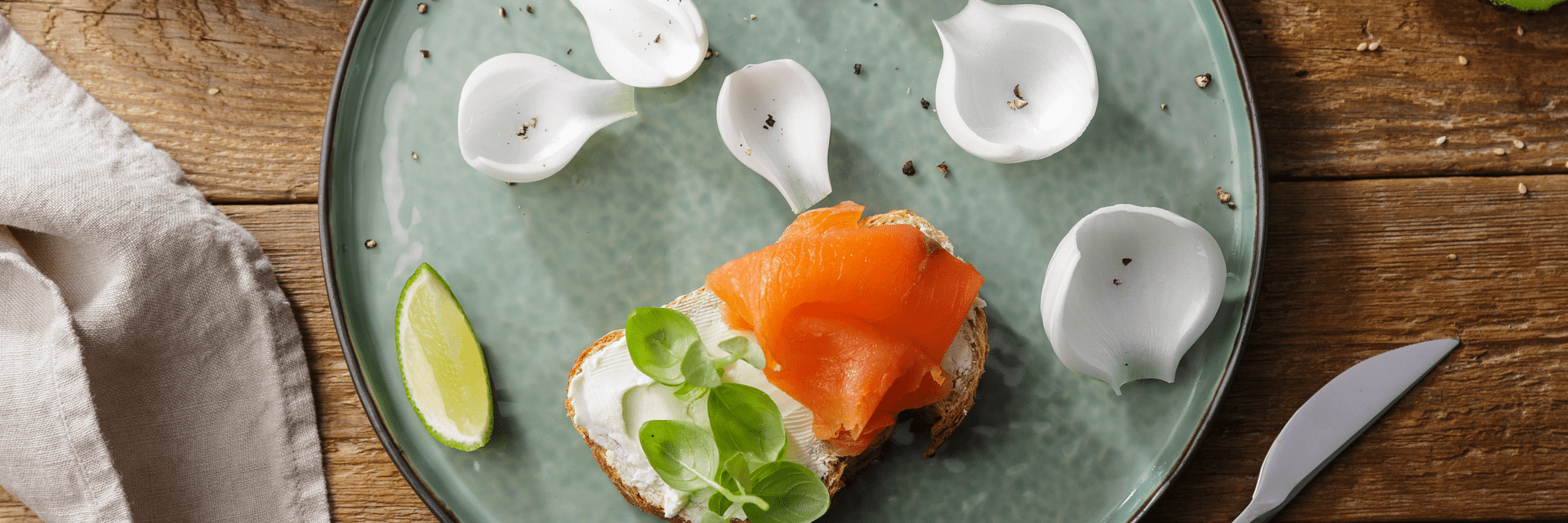However, the kind of fat in the food we eat is also definitely something worth thinking about, when it comes to maintaining cholesterol at a desirable level, for example. Current health advice is to reduce saturated fat in the diet and replace with some unsaturated fats within a healthy, balanced diet, as this has been shown to lower blood cholesterol.
So what is unsaturated fat?
What foods are unsaturated fat found in?
Good food sources of unsaturated fat include:
- Vegetable oils and vegetable oil-based soft spreads, like Flora ProActiv, are good sources of unsaturated fat.
- Nuts and seeds don’t just contain “good” fats, but also fibre, another important component of a healthy balanced diet.
- Salmon, mackerel, sardines, herring, and trout are all good examples of oily fish, which also contain unsaturated fats.
- Omega-3 and -6 are unsaturated fats
Why is unsaturated fat good for you?
It is well established that replacing saturated fat in your diet (found in butter, cheese and fatty meat products, as well as many prepared foods like cakes and biscuits) with some unsaturated fat can help lower LDL-cholesterol, one of the risk factors in the development of coronary heart disease*.
How to eat more unsaturated fat and less saturated fat
- Snack on unsalted nuts. They make an easy snack on the go, and can replace foods like pastries that are often high in saturated fat. A small handful of trail mix made of nuts, seeds, and dried fruit, as part of a meal, is a handy way to eat a little more fibre as well as unsaturated fat. Avoid roasted nuts, however, as these often have added oils that add to their calorie content as well as added salt.
- Cook with vegetable oils such as rapeseed, sunflower or olive oil. Vegetable oils are an easy way to up your unsaturated fat intake as you prepare food, making them good alternatives to cooking with butter or coconut oil that are high in saturated fat. To avoid using too much oil when cooking, measure out using a teaspoon or go for spray oils.
- Replace saturated fat with unsaturated or reduced fat options. Dairy foods like cheese, butter, and cream are high in saturated fat, but can be swapped for reduced fat alternatives or alternatives with a better balance of saturated and unsaturated fat. For example, the Flora ProActiv range includes skimmed milk drink and delicious vegetable oil-based soft spreads with added plant sterols, an active ingredient that is clinically proven to significantly lower LDL (or “bad”) cholesterol. A daily consumption of 1.5 – 2.4g of plant sterols can lower cholesterol by 7-10% in 2 – 3 weeks as part of a healthy diet and lifestyle, including sufficient fruit and vegetables**
- Use seeds as toppings. Sunflower, pumpkin, and sesame seeds are all readily available in most supermarkets, and are great sprinkled on top of salads and cooked vegetables.
- Eat oily fish once a week. Oily fish is both flavoursome and contains plenty of unsaturated fat. Try eating fish twice a week, basing one of those meals on oily fish –a number of studies have indicated that the type of Omega-3 found in fish (long-chain) can contribute towards the normal functioning of the heart.
There are also plenty of tasty recipes on the ProActiv site using oily fish: try Mackerel with Moroccan Spices or Baked Trout with Almonds to start!
Find more recipes here.
Want to find out more?
Check out our articles on saturated fat, the benefits of replacing saturated with unsaturated fat, or find out how to start lowering your cholesterol with our free Cholesterol Lowering Starter Kit.
*Replacing saturated fats with unsaturated fats in the diet has been shown to lower blood cholesterol**.
**High cholesterol is a risk factor in the development of coronary heart disease. There are many risk factors for coronary heart disease, and it is important to take care of all of them to reduce the overall risk of it.
Key references
- NHS (2017) Fat: The Facts. (accessed 16 May 2019)
- Scientific Advisory Committee on Nutrition (2018). Saturated Fats and Health. (accessed 16 May 2019).
- Hooper L et al. (2015) Reduction in saturated fat intake for cardiovascular disease. Cochrane Database of Systematic Reviews(6)
- European Commission (2016) EU register on nutrition and health claims. (accessed 16 May 2019).
- Stanner S & Coe S (2019) Cardiovascular Disease: Diet, Nutrition and Emerging Risk Factors, 2nd Edition, Keith N Frayn, Chair.Wiley-Blackwell: Oxford, UK.
The British Nutrition Foundation has reviewed the accuracy of the scientific content of this page in May 2019 (please note this does not include linked pages). The Foundation does not endorse any brands or products. For more information about the Foundation, please visit www.nutrition.org.uk
This information has been included in good faith, but is for general informational purposes only, and should not be construed as a guarantee. The nutritional facts and statements on this site are designed for educational and resource purpose sonly, not being substitutes for professional advice. If you have any concerns or questions about your health, you should always check with your GP or healthcare professional.

